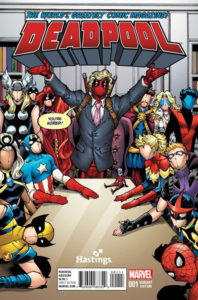
Comic Books and the Trump Presidency: Year One
Article by Jim Allegro
As we reflect on the one-year anniversary of the Trump presidency, it is notable that a man with such a strong media presence has been absent from certain mainstream comics. That Trump has yet to make an explicit appearance in a Marvel book since taking the Oath of Office is curious considering that Marvel has not shied away from depicting him in the recent past. In an alternate universe, the villain M.O.D.O.K. (Mental Organism Designed Only for Killing) became the Trump-faced M.O.D.A.A.K. (Mental Organism Designed as America’s King) for Spider-Gwen Annual #1. And, Trump-as-Deadpool graced the cover of the Hastings variant of the first issue of the title’s most recent re-launch.

The Big Two in Denial
It is not as if Marvel has a policy against depicting presidents. The commander-in-chief has made regular cameos since Thor saved JFK. Johnson pardoned Bruce Banner; Captain America saved Bill Clinton; and Obama was on the cover of Amazing Spider Man #583. But that was before we knew that Ike Perlmutter, Marvel Entertainment’s CEO, was Trump’s friend and a donor to his campaign. I doubt Perlmutter had a hand in Trump’s abrupt departure from comics, but we can speculate that Disney, which owns Marvel, would prefer not to agitate Trump. M.O.D.A.A.K.’s reappearance certainly wouldn’t help Disney’s bid to buy 21st Century Fox with a Justice Department willing to sue to block mergers. Rumor has it that Trump is aiming at the AT&T-Time Warner deal in part because he does not like the coverage of his administration by CNN, which is owned by Time Warner.
Or, perhaps the women and men who create comics would rather not legitimize the Trump presidency by situating him alongside their superheroes. DC has been more vocal in its stance toward the President by taking occasional and subtle aim at his policies. Green Arrow staged a Trump analogue in the form of the corrupt businessman-politician Nate Domini, who has appeared semi-regularly since 2016. Aquaman #30 presented a pointed allegory in the form of Corum Rath, who takes over Atlantis in order to make it ‘great again.’ Rath seeks to use magic and technology to build a wall against intruders and is keen on purging the kingdom of those who are not ‘true Atlanteans.’

Indie Comics Fill the Gap
But where the Big Two have failed to tread, independent and other comic publishers have been more open in their criticism. Image’s Savage Dragon was the first major comic to deal directly with the election. In Issue #226, Trump targets all aliens deemed a threat to national security. Perhaps no better evidence that there is space in the medium for Trump’s presidency exists than the fact that Zenescope, of all publishers, took a swipe at Trump’s misogyny on the B cover of its April Fool’s edition of Grimm Tales of Terror. Without a hint of irony, a company known for promoting hyper-sexualized depictions of women presented Trump under a bed, ready to pounce on a frightened co-ed.
Smaller companies and independent artists, too, depict Trump’s election as parody. Robert Sikoryak’s The Unquotable Trump presents his biggest lies in the form of classic covers. His homage to Marvel Treasury Edition #5 has Trump shouting superlatives as he busts Hulk-like through a wall. Trump’s Titans, from Keenspot Entertainment, glimpses a world in which Trump lives up to his own spin. Here, he is not just the world’s most powerful person; he is the most powerful being in the universe. Only Mark Zuckerberg can stop him, in the January 2018 release of Trump’s Titans vs. Mark Zuckerberg #1, that is, unless Ivanka thwarts the social media mogul.

Sooner than Later?
We’ll just have to wait for the Big Two to explicitly acknowledge what the rest of us had to accept a year ago. But, if the activities of Special Counsel Robert Mueller are any indication, that admission may arrive sooner than later. Marvel was slow to take on Nixon, until the Watergate scandal erupted. Then, Captain America and the Falcon found out that the President was the head of a secret empire. The landmark work of Steve Englehart and Sal Buscema remind us that comic books have always been political, and that presidents have always played a role, whether satirical or serious, in the medium.

![[MAY THE 4TH BE WITH YOU] STAR WARS AND THE POWER OF COSTUME](https://geekd-out.com/wp-content/uploads/2019/04/IMG_4052-150x150.jpg)


One thought on “Comic Books and the Trump Presidency: Year One”